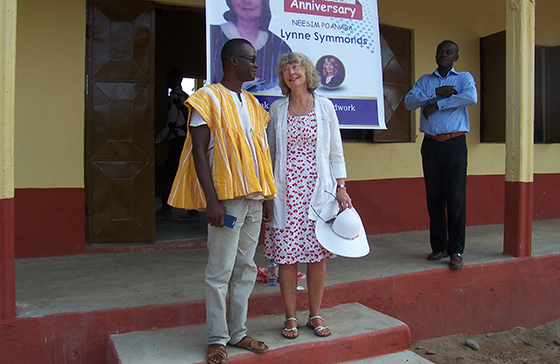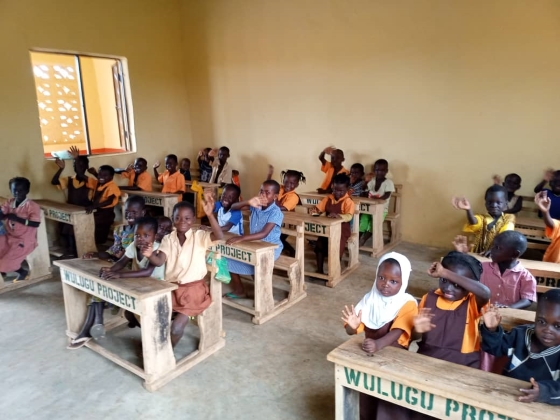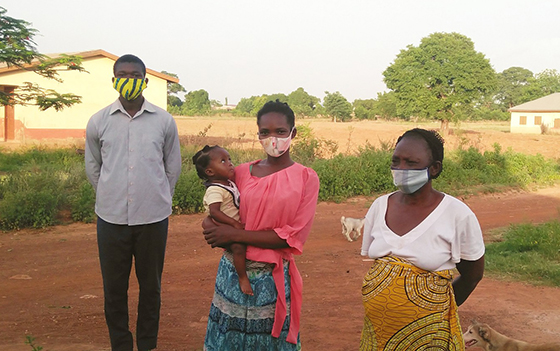Lynne Symonds has been recognised as De Montfort University Leicester’s (DMU) latest Alumna of the Month for her work on helping to improve access to education in northern Ghana.

Lynne, who studied for her Bachelor of Education at the Scraptoft campus in 1969, is the founder of the charity The Wulugu Project. From building schools to digging boreholes, its projects are driven by needs identified by the local villages, and the charity is run entirely by volunteers.
She said: “We build schools to make education available to more people. To date we’ve built or rebuilt about 100 schools and hostels for girls, and then the local authority employs the teachers and takes on the task of maintaining them.
“All of the work is done by local volunteers. These are people who really know and understand the area. We work entirely with the communities themselves, and the charity has built up a huge amount of trust and mutual respect.”

The charity aspires to give opportunities to women and girls who still don’t have equal access to education. Lynne is proud that they’ve now achieved more equal numbers of younger girls and boys in their classrooms, but said that it is still much harder for older girls to go to school.
In order to help, The Wulugu Project has established vocational training schools for these women to learn practical skills to earn their own income alongside literacy, maths, entrepreneurship and - where there is electricity - computer skills.
Lynne said: “It was a wonderful idea. There were about 40 girls to begin with, and they learnt things like catering and nutrition. Our first school, Walewale, now has around 1,000 students.
“In Ghana there is a big demand for clothing, and locally printed cotton. So we also brought over sewing machines from the UK with the help of another charity, Trade Aid, and taught tailoring, and how to dye it and print cotton.
“We have some really well qualified students who have gone into good jobs using the skills they have learned at the vocational schools. Some of our students set up their own businesses, or are taken on as apprentices in the larger villages. Some of our graduates have gone to university too.”
Since the global pandemic, the charity has changed the focus of the work in order to help communities cope with the impact of the virus.
Lynne said: “I really think Ghana is ahead of us in some ways. They’ve tested so many people. But the remote villages had no way of knowing what was happening. They were very confused that all the schools were shut. Our team made a PowerPoint and took projectors and generators into the villages – always with someone who could speak the language, because this can differ between villages – and told them about the coronavirus.”
However, in doing so they identified another issue that the villages would face in containing the virus.
“At the top of the list was soap and clean water. A lot of the villages have never had clean water. When it rains they have a lot, but when it is dry they have very little, and at this time of year many of the local ponds had dried up.
“We wanted to drill boreholes, and they needed to be mechanised to be more hygienic. To date, we’ve managed to supply about 20,000 people with clean water, which is amazing.”

One of the new boreholes
The charity has also been able to contribute in other ways.
“The girls from our vocational schools have obviously had to go home, but some have taken sewing machines home and they are making masks which they are selling in their villages. It’s helping with the problem and it’s helping the girls’ families get an income.
“We’re also currently working on a nine-room school, which will help because there will be more room for social distancing.”

Masks produced by girls at the school.
In 1996, Lynne was ‘enskinned’ as a chief of the Mamprusi Tribe in north Ghana, in honour of her charitable work. She recognises that this is a great tribute for the work of The Wulugu Project.
“It makes people want to tell me their hopes and ideas. I am so very privileged. We have a great deal to learn from each other” she said.
Her work in Ghana is a long way from the beginnings of Lynne’s studies in education at the old Scraptoft campus. Known then as the City of Leicester College of Education, the school since merged to become Leicester Polytechnic and later, DMU. Lynne has fond memories of her studies and her time in Leicester.
Lynne said: “I studied to be a teacher because I wanted to teach chemistry. I’m passionate about science education, particularly socially relevant science education.
“I used to love walking around the streets of Leicester at night time and exploring, because it was very different from Sunderland where I came from. There was so much to see, the canals and the factories. It was a fascinating place.
“I’ve been back a couple of times to meet with old friends, and it’s great how well everyone has done. They seem to have benefited so much from the whole experience.
“Our degree congregation was at De Montfort Hall. I just remember having a grand day! I never could have dreamed that my degree could have led to being able to help so many Ghanaian children go to school.”
Posted on Wednesday 22 July 2020